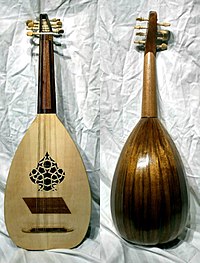 Kwitra | |
| String instrument | |
|---|---|
| Other names | Kouitra, quitra, quwytara |
| Classification | String instrument |
| Hornbostel–Sachs classification | (Composite chordophone) |
| Related instruments | |
| Oud, mandolin, mandolute | |
The kwitra (also quwaytara, kouitra and quitra); Arabic الكوترة or عود أندلسي (literally Andalusian oud); is an Algerian stringed instrument, sometimes referred to as the Algerian lute.[1][2] The instrument is tied to Andalusian musical traditions of Moorish people who were pushed out of the Iberian peninsula in the 15th century.[2] That tradition has shrunk further; where the kwitra was once seen in Algeria, today it is mainly an Algerian instrument.[2]
The literal meaning of kwitra in Algerian Arabic (and possibly in the extinct Andalusian Arabic) is "small guitar". It is a regional instrument in the lute family of instruments, related to Italian chitarra.[3]
It has eight strings in four courses. It is tuned G3 G3, E4 E4, A3 A3, D4 D4.[4] The traditional strings are made of animal intestines. They usually have a carved soundhole in the shape of a bowl or vase.
- ^ Simon, Broughton & Mark, Ellingham. (2006). The Rough Guide to World Music: Africa & Middle East. Rough Guides. p. 254.
- ^ a b c "Quwaytara, late 19th century, Moroccan". Metropolitan Museum of Art.
- ^ "ATLAS of Plucked Instruments – Africa". Retrieved 10 March 2012.
- ^ Sadie, Stanley, ed. (1984). "Quwaytara". The New Grove Dictionary of Musical Instruments. p. 176. Volume 3.
... four pairs of strings ... typical Moroccan timing is G-e-A-d ...